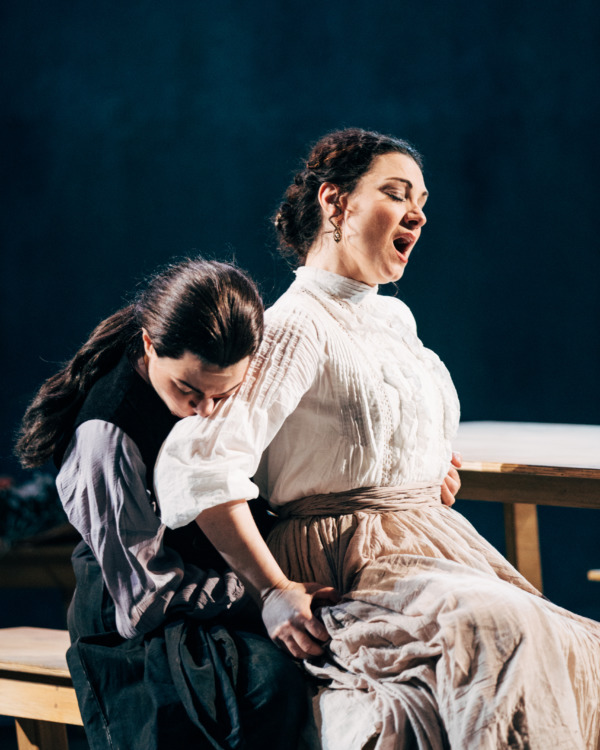Queer-themed Canadian opera makes U.S. premiere at Hampton Opera Center
FEBRUARY 2, 2022
BYANGELA ALLEN, OREGON ARTSWATCH
When the Sun Comes Out opened in 2013 in Canada, commissioned by the Vancouver Queer Arts Festival.
Now, a long eight years later, the new-music opera by Japanese-Canadian Leslie Uyeda with a gorgeous libretto by Canadian poet Rachel Rose, finally premieres in the United States. It opened Jan. 28 at Portland Opera’s Hampton Opera Center for six performances through Feb. 12. Five have sold out, though the day I went, the 154-seat space was at least a third empty. Many opera-goers may have decided to watch from home when the opera is available digitally on Portland Opera Onscreen for a limited time starting Feb. 25.
But the big question: Why do these eye-opening pieces take so long to reach us? In 2015, gay marriage was legalized in the United States. It was 2005 in Canada, and in 2002, the Netherlands pioneered it. Gay marriage is old news in the Western world, from a political standpoint, though the opera was written and sung in English. Of course there are more complex ramifications to gay marriage than legalization.
And in at least 65 other countries same-sex marriage remains a crime, many times a death sentence. And that’s what this opera is all about — and it’s about love being blind to politics: love is love, even more if you have to fight for it.
The Hampton’s intimate Hinckley Studio Theatre can be reconfigured for different shows, and this one, with the audience on three sides, left the stage to the performers. Only a pile of pale furniture morphed into a table here, a bed there. The five musicians and conductor were tucked away in a corner.
Christine A. Richardson’s simple white and beige costumes (other than the rugged mannish one worn by the intense, plucky Solana performed by soprano Cree Carrico) and Cynthia Felice’s set were neutral, indicating a lack of place other than the inside of a home, perhaps a reference to Covid’s claustrophobia. Still, there was a shawl that turned into a head scarf for Lilah (mezzo Sandra Piques Eddy), the woman who now has a child and is desperately sought out again by Solana after an affair three years earlier.
So perhaps that head scarf and mention of lemon trees in Lilah’s courtyard were clues to the setting, though the symbolism did not hit you over the head. In contrast, Solana was dressed like a Canadian explorer — hat, staff and shoulder bag. The suspenders on the two men’s costumes were a nice touch. The detail gave off a pioneer vibe, and in this opera, there are pioneers. This is a country-less, timeless piece.
As much as I adored the poetic libretto loaded with images and metaphor about two very different women— Solana comes off as daring, dangerous, brave and fickle; Lilah is a wealthy (her emerald jewels are mentioned), obedient wife and mother— who fall for each other in an unknown country where gay sex is criminalized, I was not overwhelmed by the opera.
The music falls into the category of new music, with distinctively Asian touches, and tempos were notably uneven and melody uncommon. Many listeners’ ears are not tuned to those musical values, though others of us crave and embrace brave new operas. The five Portland Opera Orchestra principals who played (cellist Dylan Rieck, flutist GeorgeAnne Rieg, clarinetist Louis DeMartino, violinist Margaret Bichteler and pianist Sequoia) conducted by Maria Sensi Sellner were excellent despite the difficult score, and never overwhelmed the singers. At times, the subtle music vanished into a backdrop, and I wish I could recall more of it.
Two dancers–Sophie Beadie and Aaron Petite of Portland’s Shaun Keylock Company–reflected complex emotions, mostly comforting with their movements the performers’ angst, but sometimes enhancing their fury. Graceful and almost soundless, they were a welcome addition to the production, and very much a part of the show’s fabric, somehow sorting out searingly difficult feelings and memories.
Then about 50 minutes into the 80-minute opera, guess who appears? A man. This is no longer a lesbian opera if that’s what you were banking on.The story gets more interesting and the stakes go higher.
Baritone Michael Parham, plays the part of Lilah’s husband, Javan. And guess what? He has a vey big secret: He’s gay, too, and has named their beloved daughter after a favorite lover, Azhar, who was killed for homosexual behavior. (Javan has intense survivor’s guilt.)
Everyone is suddenly in the same boat, despite the jealousy and secrets, and they can kill each other off before the state does, or they can help one another to forge a new future. They choose the latter after much saber-rattling and knife-drawing, and an overwhelming reason is the child — the future, a factor that the stubborn Solana must accept. Lilah and Javan must accept a new family configuration with Solana. After all, the opera is called When the Sun Comes Out; its message is ultimately hopeful.
The opera picked up with the entrance of Parham, a former PO resident artist, who has a strong voice and weighty stage presence. He added his baritone to Carrico’s soprano and to Eddy’s lovely warm mezzo (she sings often at the Met and was praised profusely for her 2015 PO Carmen performance and for the Carmen she sang twice on tour with Seiji Ozawa).
Carrico’s voice calmed down as the performance lengthened. She is a coloratura soprano and has quite a bit of ping and ring to her voice. Some call it squillo, which according to my online source is:
the resonant, trumpet-like sound in the voices of opera singers. It is also commonly called ring, ping, core and other terms. Squillo enables an essentially lyric tone to be heard over thick orchestrations, e.g., in late Verdi, Puccini and Strauss operas.
Too much and the voice sounds shrill.
And there was no thick orchestration to be heard over. Perhaps Carrico was directed to sing more stridently in the first part of the opera to show off her bravado. “I will never be a wife or a bride in dazzling white,” she sings early on. The opera space is small and the audience is on top of the singers, so the pinging and ringing were especially apparent. Eventually–most notably with Parham’s entrance–the singers harmonized in duets and trios, and there was nothing more beautifully rendered and orchestrated in the opera, without the least bit of sentimentality, than the last line: “Let us love.”

